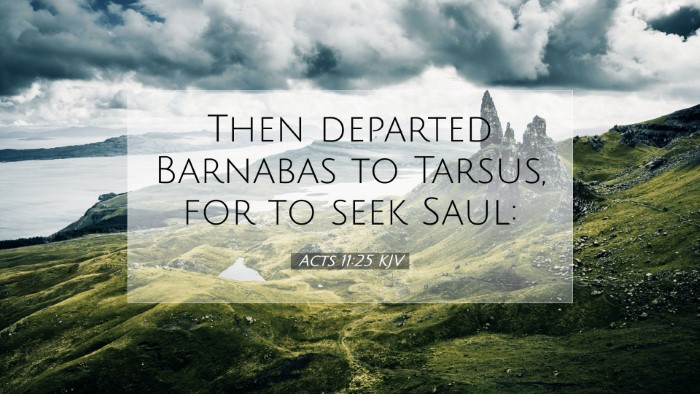Commentary on Acts 11:25
Verse Reference: Acts 11:25 - "Then Barnabas went to Tarsus to look for Saul."
Introduction
Acts 11:25 marks a pivotal moment in the early church as it highlights the critical role of Barnabas in the burgeoning Christian community. This commentary delves into the context, significance, and interpretation of this verse through a synthesis of insights from various public domain commentaries.
Contextual Background
In the preceding verses of Acts 11, after the conversion of many in the city of Antioch, the church there sends word to Jerusalem about their success. The apostles, upon hearing this, send Barnabas to encourage and teach the new believers. Barnabas’s character as a 'son of encouragement' becomes evident as he receives the grace of God at work in Antioch.
The choice to seek Saul (Paul) in Tarsus is significant. Saul, once a persecutor of Christians, had a transformative encounter with Christ and was brought to Jerusalem by Barnabas previously (Acts 9:26-30). Saul's period of preparation and reflection was essential, and his eventual involvement in the mission field speaks volumes about God's timing and orchestration.
Insights from Commentaries
Matthew Henry: Matthew Henry emphasizes the importance of Barnabas’s initiative in seeking out Saul. He notes that Barnabas acted on the impulses of his faith, believing that Paul’s experiences and gifting were crucial for the church's growth at Antioch. Henry also points out the virtues of friendship and mentorship that Barnabas exhibited in bringing Saul into this environment of grace and development.
Albert Barnes: Albert Barnes provides a deeper theological reflection on the notion of God's calling. He explains that Barnabas’s journey to Tarsus to find Saul signifies the recognition of divine appointments. This moment sets the stage for future missionary journeys and illustrates that God's plans often require human agency tempered with divine guidance. Barnes underscores the fact that the church must seek out individuals who are qualified and equipped for ministry work.
Adam Clarke: Adam Clarke remarks on the geographical significance of Tarsus. He posits that Barnabas’s trip was both literal and symbolic, showcasing the global reach of the gospel. Clarke elaborates on how Barnabas, in seeking Saul, demonstrates his love for the community and desire to promote the gospel message. He reinforces the notion that the early church was characterized by a sense of teamwork in mission, reflecting the unity of believers in Christ.
Theological Implications
The act of Barnabas seeking Saul serves as a paradigm for pastoral care, mentorship, and leadership in the church today. This example illustrates that effective ministry often involves seeking and nurturing the gifts of others within the body of Christ. As a model for church leaders, it challenges them to be proactive in enlisting those whom God has called and equipped for His work.
Furthermore, Barnabas’s pursuit of Saul also highlights the integration of diverse backgrounds in the Christian community. Barnabas and Saul came from vastly different experiences, yet their collaboration produced significant fruit. This diversity is essential for the church's mission and exemplifies the body of Christ working together in unity.
Practical Applications
- Encouragement of Others: Just as Barnabas sought to encourage the church, may leaders and pastors cultivate an atmosphere of encouragement in their communities.
- Seeking and Equipping Leaders: The church should actively seek out individuals with the potential for leadership and ministry, providing them with the necessary training and resources.
- Diversity in Ministry: Embrace and celebrate the diverse backgrounds and gifts within the church, recognizing that God can use all believers for His glory.
- Patience and Timing: Understanding that God's timing is perfect, the church must remain patient as individuals are prepared for their roles in ministry.
Conclusion
Acts 11:25 serves as a reminder of the collaborative nature of ministry and the importance of mentorship. Barnabas’s decision to find Saul illustrates not just a willingness to help, but a strategic understanding of the need for diverse gifts in the church's mission. The reflections from various commentaries provide a comprehensive understanding of this pivotal verse, encouraging believers—pastors, students, and theologians alike—to reflect on their roles in nurturing and promoting the gifts of others within the body of Christ.


